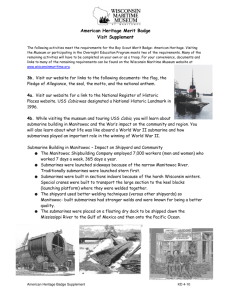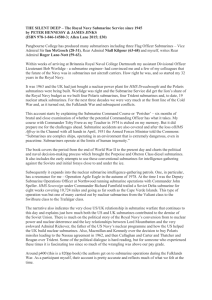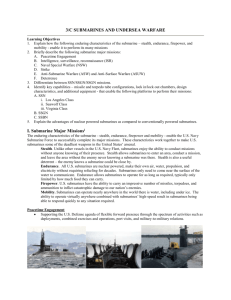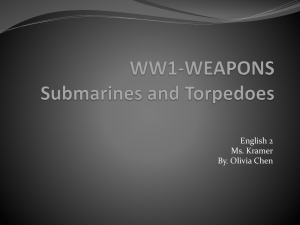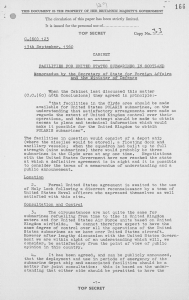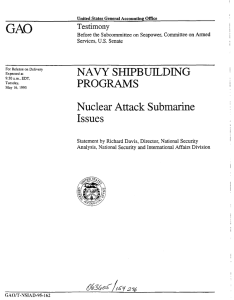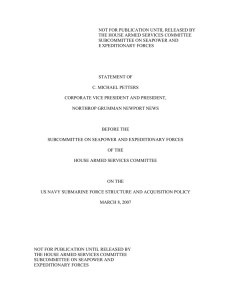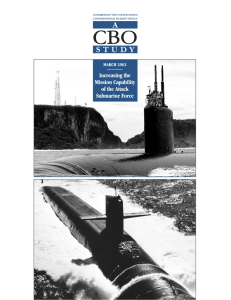Statement of Vice Admiral Albert H. Konetzni, Jr. USN (Retired) Before the
advertisement
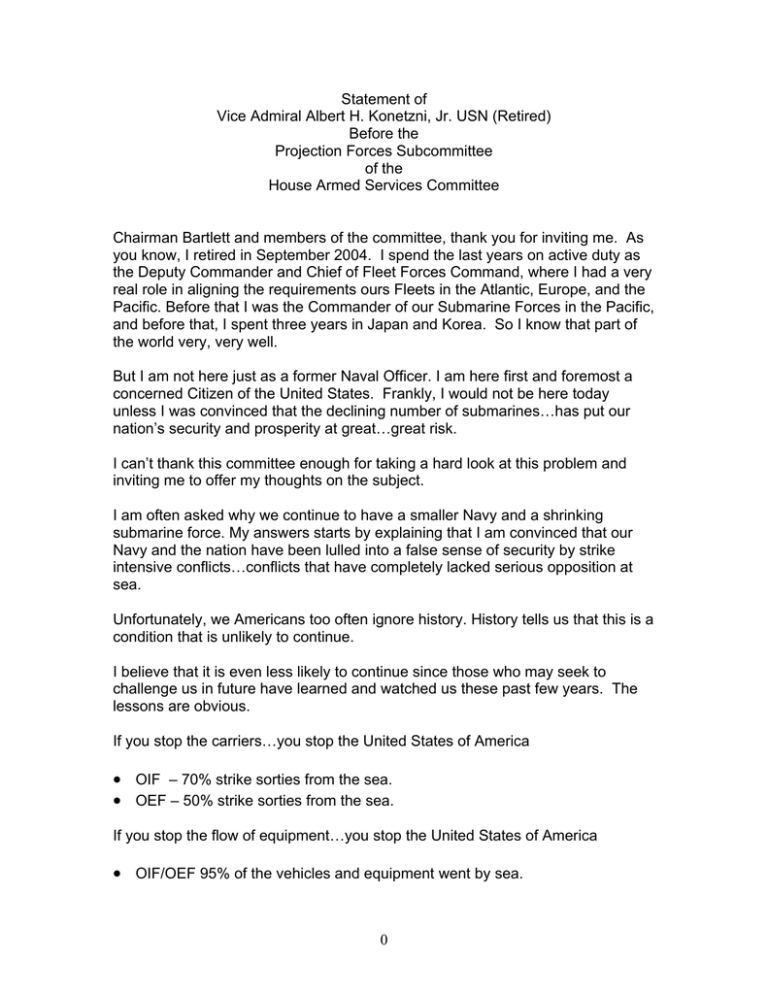
Statement of Vice Admiral Albert H. Konetzni, Jr. USN (Retired) Before the Projection Forces Subcommittee of the House Armed Services Committee Chairman Bartlett and members of the committee, thank you for inviting me. As you know, I retired in September 2004. I spend the last years on active duty as the Deputy Commander and Chief of Fleet Forces Command, where I had a very real role in aligning the requirements ours Fleets in the Atlantic, Europe, and the Pacific. Before that I was the Commander of our Submarine Forces in the Pacific, and before that, I spent three years in Japan and Korea. So I know that part of the world very, very well. But I am not here just as a former Naval Officer. I am here first and foremost a concerned Citizen of the United States. Frankly, I would not be here today unless I was convinced that the declining number of submarines…has put our nation’s security and prosperity at great…great risk. I can’t thank this committee enough for taking a hard look at this problem and inviting me to offer my thoughts on the subject. I am often asked why we continue to have a smaller Navy and a shrinking submarine force. My answers starts by explaining that I am convinced that our Navy and the nation have been lulled into a false sense of security by strike intensive conflicts…conflicts that have completely lacked serious opposition at sea. Unfortunately, we Americans too often ignore history. History tells us that this is a condition that is unlikely to continue. I believe that it is even less likely to continue since those who may seek to challenge us in future have learned and watched us these past few years. The lessons are obvious. If you stop the carriers…you stop the United States of America • OIF – 70% strike sorties from the sea. • OEF – 50% strike sorties from the sea. If you stop the flow of equipment…you stop the United States of America • OIF/OEF 95% of the vehicles and equipment went by sea. 0 If you stop the flow of commerce…you cripple the United States of America and our people’s way of life. • About 95% of imports and exports still travel by sea. Sometimes I worry that we have forgotten that job one for the U.S. Navy is to ensure that no nation is ever capable of denying us such access. It is my belief that the U.S. Navy’s first obligation must always be to secure the maritime commons for the security and prosperity of the American people. Assuring access means you have to capable of mine warfare and anti-submarine warfare. Only the U.S Navy can do these missions, it is the Navy’s responsibility. Today, I want to talk about that responsibility with regard to submarines. There are over 400 submarines in the world today. I believe this global proliferation of Submarines clearly poses the greatest threat to that maritime security…a threat that has gone too long with too little focus, investment, and training. I am not an historian…but you don’t have to look hard at the past to understand that today submarines are the decisive weapons of war at sea. The German U-boat campaigns of World War I and II were nearly decisive. In World War II our Submarine Force comprised less than five percent of the Navy, yet: • It sunk over 50% of Japanese shipping • And inflicted 30% of their Navy’s loses (8 aircraft carriers, 1 battleship and 11 cruisers) Today, both diesel and nuclear submarines are even more lethal and effective. Some ten years ago, some well respected strategist said this: “We can conclude that during the First World War, the dominant vessel was the battleship, and in World War Two, it was the aircraft carrier. In future global wars, the most powerful and decisive weapon will be the submarine.” The problem is that these were not American, they were Chinese. Mr. Chairmen, the questions we must ask ourselves is: Will it be our submarines or their boats that will be decisive? What is clear to me is, that while we take control of the seas for granted, our most serious potential competitors do not. As a result, they are acquiring more and better submarines. While our capabilities decline…theirs are on the rise. 1 You need look no further than China. I love China. We have a lot to do with China. But that doesn’t change the fact that we are competitors over Taiwan. China’s naval build up should be of serious concern to all of us and to all Americans. Congressmen Simmons, I want to thank you in particular for continuing to express your concerns about China. They are well founded. Today, China is outpacing US Submarine Production at least five fold. They fielded 12 new subs in 2004 and 2005. Today, they have 63 submarines, 50% are modern and highly capable. New nuclear missile and attack boats are entering their fleet sooner than originally predicted. • 1 JIN SSBN (on sea trials) – carries JL-2 missile that is capable of hitting the continental U.S. from the East China Sea. • 2 Shang Class SSNs (One finishing and another starting Sea Trials). • These complement the older XIA SSBN and 4 HAN SSNs. • And they are building more (Looking at 6 SSBNs and 12 SSNs by 2020). Equally alarming, they have bought and built the largest modern diesel fleet in the world. They include three classes which are among the most quiet and capable diesel submarines at sea today. • 1 New YUAN SSK (a surprise to us until in the water). • 13 SONGs SSKs (avg 2 per/year) • 9 Russia KILO SSKs (3 more on order) These classes are bolstered by 9 semi-modern MINGs (90s vintage) as well as a combination of 23 older MINGs and Romeos At this pace, China will have 75 modern submarines by 2020. Mr. Chairman, we cannot accept politically correct argument that says this capability simply poses us NO threat. We must ask the tough questions. Why so many? So fast? Who are they planning to use these submarines against, other than us? Our answer should be clear. We will not allow these or any other Submarines to threaten our security. To do that, our anti-submarine warfare capabilities must be robust, clear and convincing. Submarines remain, by far, our most capable anti-submarine assets. That is because they have the best sensors, weapons, and ability to survive. 2 Mr. Chairman, we cannot believe those who tell that there are mystical magical solutions to this tough problem. The attitude of the American people and this Congress should be, show me those capabilities first before we reduced the number of submarines any further. The reality remains that in this fight, numbers matter. The physics of the problem still won’t let you get around that. We learned from the Cold War that our ASW efforts must be coordinated and that the lynchpin of that capability must be an adequate number of submarines. I am convinced that submarine force structure has been studied more than any other topic in history of our country. At least, 14 times in the last 12 years. Study after study, have called for between 55 to 80 SSNs to meet the nation’s requirements. Yet we have allowed our force to decline to 54. In every one of these studies, the absolute low end number has been 55. We have to ask ourselves, what has changes? I believe, for instance, that the 48 SSN requirement being tossed out by the Pentagon most recently is truly flawed because: • It calls for about 18 subs to fight a war in the Pacific. • The math doesn’t add up. We studied this intensely during the Cold War. 18 vs 75 or more isn’t going to be pretty!! • The ASW problem in the Pacific has clearly become more not less difficult since that 1999 JCS study called for 68-72 submarines (low of 55 for warfighting). Yet, unless we act now and increase production, we will fall below the even established Navy’s rock bottom requirement of 48 in 2019. The consequences to our national security are grave. Some say the Chinese have second rate Navy. I have watched this closely and I must respectively disagree. They are clearly committed to developing the full spectrum of naval capabilities. While they do have a long way to go in terms of some other missions, they are clearly masters at anti-surface warfare. That is the ability to sink ships. China submariners are as good as anyone in the world at that mission. They have great torpedoes and they have practiced and practiced and practiced! I worry about the scenario. I see us putting on our whites hats and heading over the horizons to rescue our friends in Taiwan. In such an event, by some conservative estimates, the Chinese submarine force currently could sink anywhere from 6-12 ships in the first week of a war possibly including a carrier. That is between 3600 and 10,000 young Americans lives lost in just the first 3 week. A blow that it would be tough to recover from and even tougher to explain to the American people. Mr. Chairman, there are also those who will say that it will not be this bad, that we are invulnerable. I don’t want to be an alarmist, but any honest analysis will show that it will probably be even worse. This war may never happen, I pray it doesn’t. But if it does, we will have those lives on our hands and the future of the Pacific on our conscious. I have always believed that the best way to avoid war is to be ready. The only way to be ready and to avoid this tragedy is to build an adequate number of submarines. We must give our young men and women the best chance to deter such a war and to win it, should deterrence fail. Mr. Chairman…if we are intellectually honest…if we look at the threat…if we look at the requirements…if we look at what is best for the American people…the right answer is to invest in more submarines. I applaud Admiral Mullen’s decision to move additional Submarines West. This is a good first step. Next, we must increase the Virginia class production rate to at least two per year…and not in 2012 but as soon as possible. We have delayed the start of dual production 10 times since 1995. Given the threat, it makes absolutely no sense to delay any longer. Finally, Mr. Chairman, if we are not going to make this investment. If we are going to put our security and the lives of our young men and women in the Navy at such risk then I think we are all obligated to explain that to the American people. They need to know. Thomas Jefferson said that “if you give the American people the facts, they will do right thing.” I am hopeful that this Congress will look at the facts and do the right thing. I am honored to be here and ready to take your questions. 4
